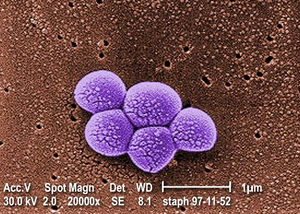Tea Tree Oil Treatment of MRSA
Introduction
Antibiotic resistance is a growing problem as an increasing number of pathogens is becoming less susceptible to commonly used antibiotics. The increasing difficulty of treating these pathogens underscores the importance of discovering alternative anti-microbial treatments. One potential alternative anti-microbial agent is tea tree oil, the essential oil derived from the Australian native plant Melaleuca alternifolia. The topical application of tea tree oil has been used for centuries as a folk remedy for a number of conditions, including acne and lice. Recent clinical studies indicate that tea tree oil can also treat skin infections of drug-resistant bacteria, including the staph infection of methicillin-resistant Staphylococcus aureus (MRSA). Tea tree oil's bacteriocidal and bacteriostatic effects make this plant extract a plausible addition or supplement to a MRSA treatment plan.
MRSA is a Gram-positive coccus-shaped anaerobe that ... MRSA poses a public health risk as it is commonly contracted in healthcare and community settings and cannot be treated with common antibiotics.
Tea tree oil...
Mechanism of Action
....
Section 2
Include some current research in each topic, with at least one figure showing data.
Section 3
Include some current research in each topic, with at least one figure showing data.
Conclusion
Overall paper length should be 3,000 words, with at least 3 figures.
References
Edited by Karen Leung, a student of Nora Sullivan in BIOL187S (Microbial Life) in The Keck Science Department of the Claremont Colleges Spring 2013.

